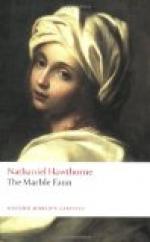“This is a wine,” observed the Count, “the secret of making which has been kept in our family for centuries upon centuries; nor would it avail any man to steal the secret, unless he could also steal the vineyard, in which alone the Monte Beni grape can be produced. There is little else left me, save that patch of vines. Taste some of their juice, and tell me whether it is worthy to be called Sunshine! for that is its name.” “A glorious name, too!” cried the sculptor. “Taste it,” said Donatello, filling his friend’s glass, and pouring likewise a little into his own. “But first smell its fragrance; for the wine is very lavish of it, and will scatter it all abroad.”
“Ah, how exquisite!” said Kenyon. “No other wine has a bouquet like this. The flavor must be rare, indeed, if it fulfill the promise of this fragrance, which is like the airy sweetness of youthful hopes, that no realities will ever satisfy!”
This invaluable liquor was of a pale golden hue, like other of the rarest Italian wines, and, if carelessly and irreligiously quaffed, might have been mistaken for a very fine sort of champagne. It was not, however, an effervescing wine, although its delicate piquancy produced a somewhat similar effect upon the palate. Sipping, the guest longed to sip again; but the wine demanded so deliberate a pause, in order to detect the hidden peculiarities and subtile exquisiteness of its flavor, that to drink it was really more a moral than a physical enjoyment. There was a deliciousness in it that eluded analysis, and—like whatever else is superlatively good—was perhaps better appreciated in the memory than by present consciousness.
One of its most ethereal charms lay in the transitory life of the wine’s richest qualities; for, while it required a certain leisure and delay, yet, if you lingered too long upon the draught, it became disenchanted both of its fragrance and its flavor.
The lustre should not be forgotten, among the other admirable endowments of the Monte Beni wine; for, as it stood in Kenyon’s glass, a little circle of light glowed on the table round about it, as if it were really so much golden sunshine.
“I feel myself a better man for that ethereal potation,” observed the sculptor. “The finest Orvieto, or that famous wine, the Est Est Est of Montefiascone, is vulgar in comparison. This is surely the wine of the Golden Age, such as Bacchus himself first taught mankind to press from the choicest of his grapes. My dear Count, why is it not illustrious? The pale, liquid gold, in every such flask as that, might be solidified into golden scudi, and would quickly make you a millionaire!”




